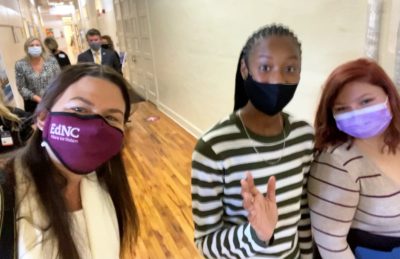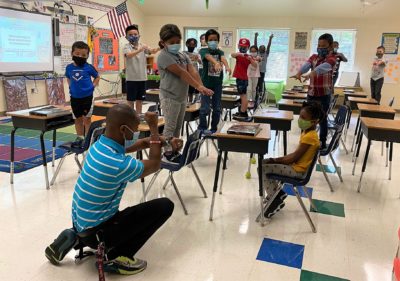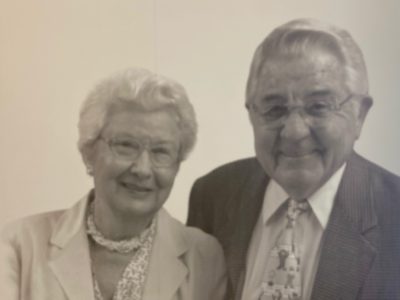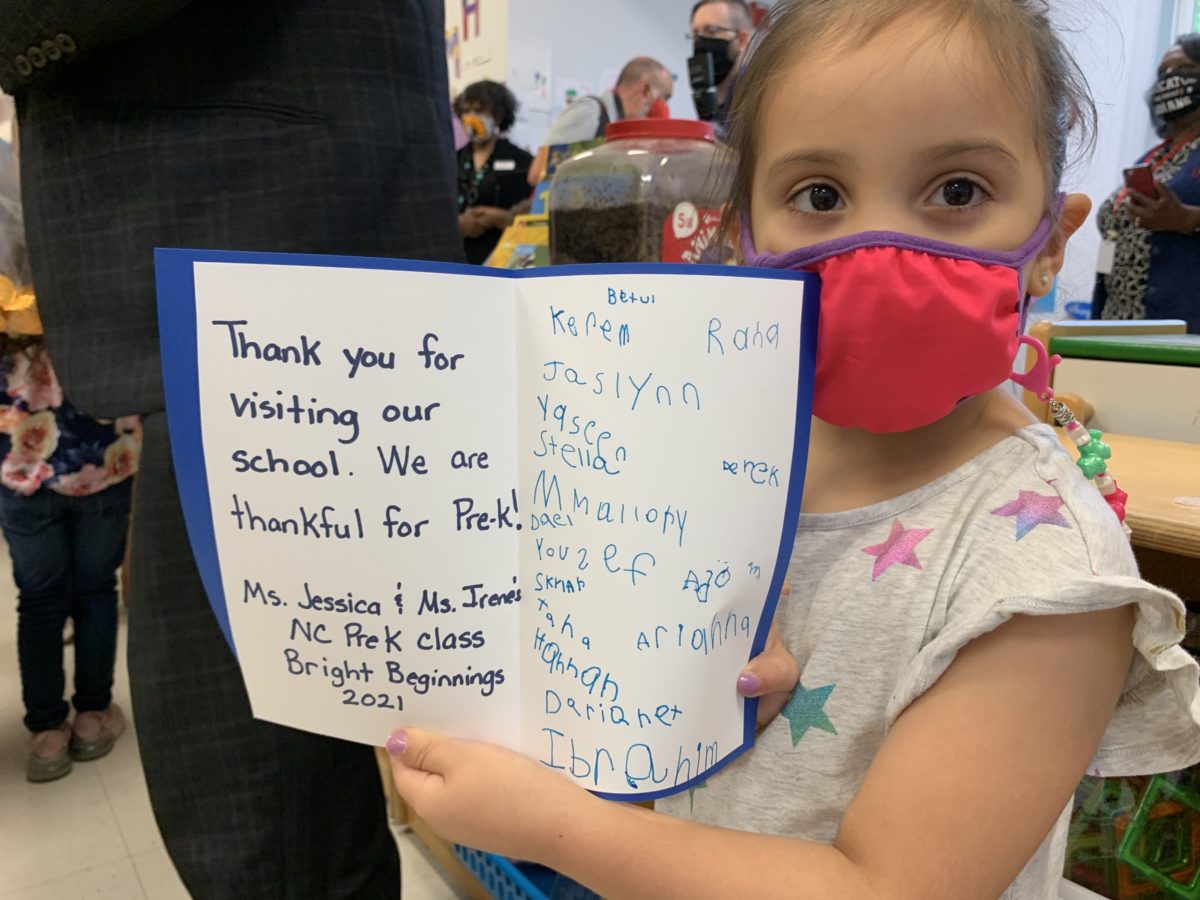
|
|
Early on in the pandemic, EdNC decided to show up in your classrooms and communities even before a vaccine was available. In that first year, from March 2020 to March 2021, we safely visited 45 school districts and 29 community colleges in person.
As we traveled to tell your story, our audience increased by 142% in 2020 and kept growing in 2021, a year when interest in news declined and news engagement “fell off a cliff” for other outlets.
Your story became our story.
Each year, we survey you — our audience — to assess and track our impact. This year, more than 1,500 of you responded — double that of last year! Seventy-eight percent agreed or strongly agreed that our coverage is neutral. Of the 29 respondents that left us comments on bias, some think we lean left and some think we lean right. We take that as a win.
Here is what you do with our articles:
- 67% of respondents discuss something they read on EdNC with colleagues.
- 39% share our articles.
- 33% apply knowledge gained from EdNC in their work.
- 21% changed their mind about an issue because of our work.
- 13% discuss what they read on EdNC with policymakers.
About 400 of you said you were willing to help us better understand the communities where you live and your untold stories. A qualitative analysis of the 795 comments you left will inform our work going forward.
“EdNC has motivated me to be a teacher more than anything. I’m excited to see the articles about what different teachers and different school systems are doing to improve education.”
“I read the newsletters and feel like at least one organization in the state is on my side and the side of my students.”
“EdNC has helped me understand what other community colleges have done and are continuing to do during the pandemic and following drops in enrollment. I have a better grasp of data, can apply that to my own work as a department chair, and can brainstorm with colleagues using information I’ve learned from EdNC. You all are really doing statewide work and it’s very much appreciated.”
“I use EdNC as my primary source of information regarding 58 community colleges.”
— Impact survey responses
It has been and remains our privilege to serve you during these unprecedented times.
EdNC’s Theory of Change
Our theory of change includes eight drivers of impact.
1) Journalism as the fourth estate in a democracy
To date, we have published 6,456 articles lifting up 1,163 voices from across our state, collectively writing the story of education in North Carolina.
“When I first began my role in my current position, I was new to the field of education except as it pertained to my now college educated children. Many things were very new to me, the Leandro case being one of them. While I tried very hard to get a grasp on things to gain a better understanding….it was still all Greek to me. Then I read an article on EdNC. This was the first time I began to understand what all the hoop-la was about…and it was finally making sense. The articles explain everything in laymen’s terms so that you don’t require a PhD. to know what is being written about. This is why I read EdNC everyday, whether I am looking for an answer to something going on the courts, the Governor’s office or in our schools (where my grandchildren attend).
— Impact survey response
EdNC is the trusted, go-to source for award-winning education news in North Carolina, and our work is republished and referenced nationally by news outlets including The 74 and The Hechinger Report, foundations, and other education organizations.
2) In-depth research
EdNC conducts public policy research on the issues surfaced by the news.
We published an all-team special report looking at lessons learned from the 2020-21 school year and how those lessons informed plans for the 2021-22 school year.
We partnered with Public Impact and the NC School Boards Association to track COVID-19 trends in education.
In 2022, EdNC conducted place-based research on Hertford County, and short-term research on homelessness, enrollment, RISE, faculty pay, and adult learners.
Our team conducts ongoing research on early childhood, literacy, equity, rural education, the arts, faith, STEM, health and mental health, postsecondary access, and innovative, best practices in education.
3) Building and engaging our audience
In 2021, 1,171,164 individuals comprised our audience with 2,021,970 pageviews collectively. Our three-month rolling average is a monthly audience of 99,283 individuals generating 160,964 pageviews.
We send out 249,272 emails each week through four newsletters: EdDaily, EdWeekly, Awake58, and Early Bird. You can sign up for all of them here.
Sign up for the EdDaily to start each weekday with the top education news.
This year, we partnered with BCom Solutions to optimize our paid media strategy on Facebook. Our audience on Facebook increased to 26,892, on Twitter to 14,766, and on Instagram to 2,266.
Overall, 39% of our articles are found through searches on the Internet leading people to our website, 26% are found through social media, and the rest are found through other sources, including emails and newsletters.
The Assembly, a new digital magazine about all things North Carolina, calls our reach “an impressive number for a single-issue outlet.”
Collectively, our audience breathes life into the “architecture of participation” we built to tell the stories of your commitment to our students, our state, and our future. Thank you.
4) Tracking the impact of our work
An external, independent review of our work funded by the Oak Foundation found, “With a significant distance between the education system’s political governance and actual events and activities in our schools, EdNC’s work is critical in helping education stakeholders and the public better understand the various and sometimes complicated issues impacting children’s learning and instruction. Their work helps fill the information gap between the capital and the classroom, and encourages engagement and conversation among those with an interest in education.”
5) Moving the needle on policy change
After years of discussion by state agencies about the science of reading, the N.C. General Assembly ratified a bill mandating that instruction be based on this body of research. It passed both the Senate and House with nearly unanimous support in just three days. Rupen Fofaria’s reporting played a key role in educating the public, educators, and policymakers.
“Keep it up – you are playing a critically important role in moving the needle in the state.”
— J.B. Buxton, former member of the State Board of Education and current president of Durham Technical Community College
N.C. Attorney General Josh Stein filed a lawsuit and announced a statewide investigation in e-cigarettes. The complaint cites the reporting of Yasmin Bendaas and EdNC.
“We appreciated that Yasmin’s reporting helped educate the public about the impacts of the youth vaping crisis,” Stein said.
6) Responsive experimentation in the new media and nonprofit world
In 2022 and beyond, we are iterating our strategy to broaden and deepen our reach in all 100 counties. We are sharing our playbook on content distribution and audience engagement with the media industry. And we continue to work on diversity, equity, inclusion, and belonging across the intrapersonal, organizational, community, and systems dimensions day in and day out.
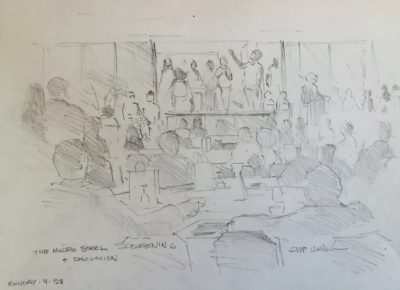
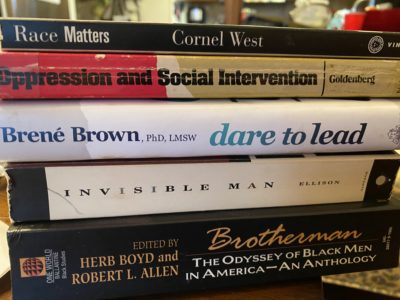

7) The broad base of financial support for our work
Our funders breathe life into our work. Here are our supporters by year. Thank you!
8) Increasing leadership capacity statewide
Our commitment to collective leadership extends beyond our organization.
Mebane Rash is the CEO and editor-in-chief. This year, she was honored with the Friday Medal, and she was included in Business North Carolina’s inaugural Power List of North Carolina’s most influential leaders. Mebane traveled to 19 counties between August and December in 2021.
Alex Granados is our senior reporter, and he daily sets the bar for all of us and education reporting statewide. “I wanted you to know how valuable I find your analysis and writing. Always clear, to the point, and painstakingly fair,” writes one reader.
Nation Hahn is our director of growth. This year, he is leading the Blue Cross Blue Shield of North Carolina’s Extra Miles Tour to all 100 counties, and he is in the Hunt Institute’s second cohort for ElevateNC: Higher Education. He traveled to 16 counties between August and December in 2021. He consults with news outlets across the nation on engagement journalism.
Liz Bell is our early childhood reporter. Her work is republished by other outlets including The 74 and The Hechinger Report, and she serves as a moderator and panelist in conversations about early childhood. She leads EdNC’s publishing of perspectives, identifying and lifting up voices statewide.
Molly Osborne Urquhart is our director of news and policy. Molly completed the Institute for Citizen & Scholars Higher Education Media Fellowship in May 2021 and now serves as a mentor to fellows.
Caroline Parker is our director of rural storytelling and strategy with a focus on STEM, faith, and arts and education. Her commitment to telling stories that help us understand the strength of rural places is unparalleled. She traveled to 20 counties in 2021.
Rupen Fofaria is our equity and learning differences reporter. He is in the Public School Forum’s 2021-22 class of Education Policy Fellows. He worked with the Friday Institute on the NC PreK-12 Literacy and Equity Summit in January 2022.
Alli Lindenberg is a multimedia storyteller with a focus on all things audio. Alli is participating in the Anita M Perlman WLI Fellowship.
Anna Pogarcic is our director of content. Anna is in the 12th class of EWA Reporting Fellows.
Eric Frederick is our part-time news and audience editor. He writes the weekly NC Local newsletter.
Emily Thomas is a policy analyst with a focus on community colleges, postsecondary access, and attainment. She teaches public speaking to adult and high school students at Caldwell Community College & Technical Institute.
Sergio Osnaya-Prieto is our director of communications. He is leading the implementation of our playbook on content distribution and audience engagement and joined us in the first cohort of organizations in the NC Media Equity Project.
Dean Drescher is our director of operations. She is in the 2021-22 class for Leadership North Carolina.
Newer members of our team include Katie Dukes, our policy analyst; Cheyenne Davis, our first regional reporter, focusing on eastern North Carolina; and Michelle Marshall and Alessandra Quattrochi, our John M. Belk Endowment Impact Fellows.
Derick Stephenson is our equity editor, and Tara Kenchen is our equity auditor.
Our thanks to Ferrel Guillory, who participated in a seminar on board governance on “for purpose” organizations. Also our thanks to Kelley O’Brien, Analisa Sorrells, Unity Web Agency, and Outfitters4, who play invaluable roles on our team. Many thanks to our attorney, Amanda Martin, and our accountants, Batchelor, Tillery & Roberts, LLP.
EdNC also invests in leadership across the ecosystem. This year, the new statewide director of Teach For America, Dr. Monique Perry-Graves, has been writing for EdNC and attended the Aspen Institute’s executive seminar. Carol Bono with LatinxEd is participating in the Public School Forum’s 2021-22 class of Education Policy Fellows.
About EdNC
EducationNC has been operating online since Jan. 12, 2015, and June 30, 2021 marked the end of our seventh fiscal year.
Our mission is to expand educational opportunities for all students in North Carolina, increase their academic attainment, and improve the performance of the state’s public schools. We provide residents and policymakers with nonpartisan data, research, news, information, and analysis about the major trends, issues, and challenges bearing on education. We gather and disseminate information employing the most effective means of communication, primarily through the Internet. In addition to the content distributed, we encourage an active and connected community of those interested in education policy and practice throughout the state. Our work encourages informed participation and strong leadership on behalf of the students of North Carolina.
EdNC uses a layered media strategy to engage you — all of you — in our architecture of participation across the education continuum from birth to career.
Social first content happens when we are out and about in schools and community colleges in the communities they serve. Our news documents in real time what is happening — when and where and why, providing comprehensive coverage of issues, covering stories over time, as well as enterprise projects. We then conduct in-depth research and policy analysis on the issues surfaced by the news. EdNC’s surveys allow our audience to weigh in on the issues and our work — sometimes our reporters follow up and a respondent becomes a source for a story; other times, we go on to share responses with philanthropists and policymakers. Our multimedia capacity allows us to infuse our work with graphics, audiograms, podcasts, videos, short and long-form documentaries. Instead of having annual or traditional convenings, we use a more responsive events strategy, providing support for events, holding listening sessions in community, or convening stakeholders as needed.
Here are our statements on journalistic independence and equity.
EdNC’s Board of Directors and Strategic Council
In 2021, EdNC changed our governance model to align with our diversity, equity, inclusion, and belonging work.
Here is who serves on our board and strategic council.
EdNC’s Annual Report and Financials
Here are EdNC’s previous annual reports. Here are EdNC’s audited financial statements and tax returns.
Thank you for your ongoing support of EducationNC. We could not do our work without you. Expect great things from us, and please donate so we can continue to grow our impact in 2022 and beyond.
Recommended reading
